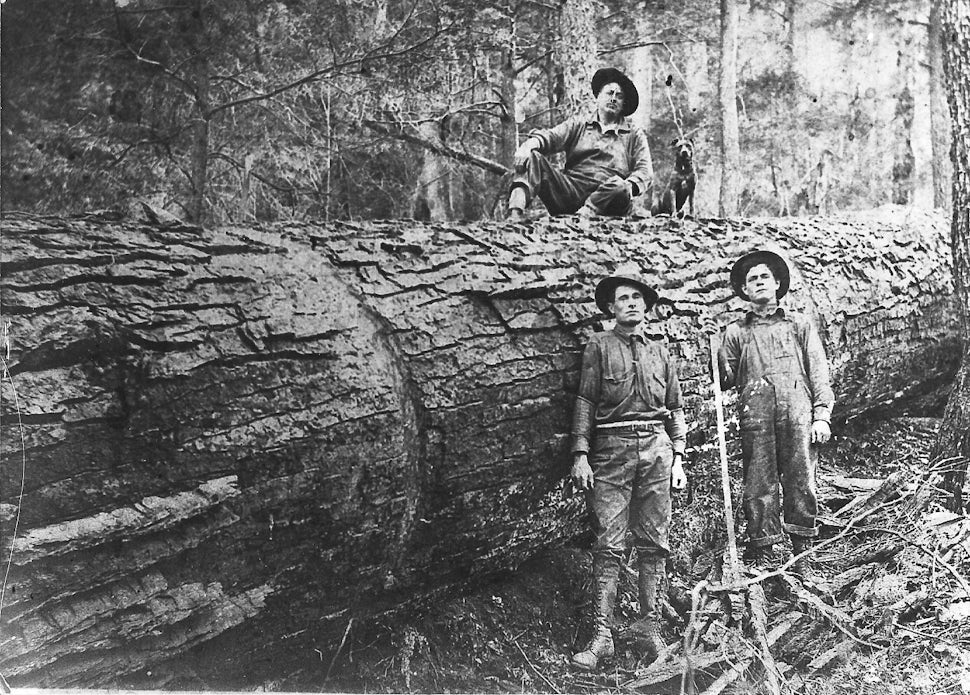Family Trees: How Our Relationship with the Forest is Advancing
A Wilderness ranger's perspective on our evolving relationship with public lands and revisits the roots of our forest


As a 27-year-old, former business development manager turned Wilderness Ranger, I’ve seen changes. I began studying Forestry and Wildlife Biology while playing soccer for Hiwassee College, but completed my undergraduate studies after transferring to Carson-Newman in Social Entrepreneurship and Psychology. Upon graduation, I found myself on the other side of the world on a few mountain tops working at an orphanage in Pokhara, Nepal. The Himalayans solidified my love for social empowerment, sustainable conservation and community. I became hungry to learn more about my own story, my own community and how I got here. The shade of my East Tennessee family tree was drawing me home to my familiar mountains.

My great grandfather, William Mose Mason and his brother went to work for Babcock Lumber Company in Tellico Plains, Tennessee shortly after it's establishment in 1906. Eventually his two sons, my great uncles, would also become lumberjacks. Their work was spread throughout the Tellico Plains area, but more specifically it was focused in the Bald River watershed and later in the Citico Creek watershed in the 1920's. Just four years later in 1924, the land was stripped and every piece of Babcock's lumber equipment was moved out of Tellico Plains.
The following year in 1925, Babcock sold 44,000 acres to the United States Forest Service. Upon the sale, the Forest Service concluded they had cutand harvested over 300 million board feet from the area. Mose's focus then began to shift. He would later work for the Civilian Conservation Corps rehabilitating the land that the timber company had recently logged. They planted trees, built campsites, trails, and fire towers in the mid 1930's. The first C.C.C. camp in Tennessee was restored and is now the Tellico Ranger Station. Its foundation adds a new slate to my family's history. They began to view this resource as one that has many uses, as opposed to the timber company's singularly exploitative view.
The forest resource would help build and strengthen the infrastructure of our nation. It would now not only be a source for timber, but also a source for recreation and clean water. Over time, these forests regenerated. The mountains are resilient. They are ancient relics of geological events that occurred during the formation of Pangaea 480 million years ago. They know change as well.

Today, I find myself in these same two areas which now enjoy permanent protection as Bald River Gorge and Citico Creek Wildernesses, walking the very footprints forged by my family three generations ago. I witness those old family trees thriving under their own power, rerooting and burgeoning back to life. I have sustainable opportunities to work under those great white oaks and make a living by preserving Wilderness character as a Wilderness Ranger for Southern Appalachian Wilderness Stewards in the Cherokee National Forest. I continue the transition my great grandfather started 100 years ago. I protect a legacy that will endure even for the families that come after my own.
I’d say that some areas yearn for a breath. Especially those that bared their burden and paid their dues. Our land ethics are changing. We once saw wild places as a resource to be feared and overcome, valued only as potential sources of board-feet. Now, these mountains have proven to be even more valuable to society as a source of enduring protection for clean water, clean air and diverse habitat. Even more, these places are my solace -where broken hearts and broken souls are mended. I play in them and I pray in them. In their hills lie a source unseen. Within these lands, among the visible scars of utter depletion, you'll see a forest growing, healing and changing. Don't be surprised to see your heart experience the same.

------------------------------------
The black and white photo is of Mason's great-great-uncle Rankin taken in the Cherokee National Forest.
Mason Boring grew up in Madisonville, TN. He's a WildernessRanger with Southern Appalachian Wilderness Stewards (SAWS) working tocomplete trail surveys, review Trail Management Objectives, and educate the public in Leave No Trace as a Master Educator in 10 Wilderness areas of the Cherokee National Forest.
SAWS is a conservation nonprofit organization dedicated to educating, cultivating and empowering an engaged public for the stewardship of protected public lands. We are a proud partner of the United States Forest Service. We focus our efforts in the Cherokee, Nantahala-Pisgah, Chattahoochee, Sumter and the George Washington and Jefferson National Forests. To learn more about SAWS and how to get involved, visit trailcrews.org and follow us on Instagram and Facebook!
We want to acknowledge and thank the past, present, and future generations of all Native Nations and Indigenous Peoples whose ancestral lands we travel, explore, and play on. Always practice Leave No Trace ethics on your adventures and follow local regulations. Please explore responsibly!
Do you love the outdoors?
Yep, us too. That's why we send you the best local adventures, stories, and expert advice, right to your inbox.








